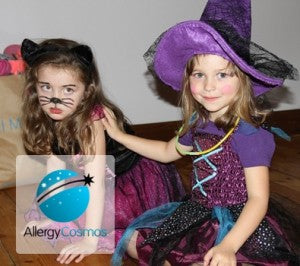Dressing up, early fireworks, and trick or treat make Halloween a fun way to round off half-term - but children with allergy need to be careful. Prof Sean Cahill, a paediatrician at Loyola University in Chicago, sounds a cautionary note. 'Nut allergies can be especially dangerous,' he says. 'Allergies can be a life-or-death situation. Just because a child only had a rash the first time exposed, doesn't mean it won't be more serious the next time.' Trick or treat is becoming increasingly popular in the UK. If your child does have a nut allergy, here's how to keep them safe, without spoiling their fun.
- If your children are very young, prepare the way with your neighbors. Give them nut-free candy ahead of Halloween and take your children to these 'safe houses' for their treats.
- If your child is older and goes out with friends, ask them to hold off eating their treats until they get home. Then remove all those with nuts or anything else that could cause an allergic reaction.
- Remember, some children are extremely sensitive to nuts, so protect them by making sure you brush your teeth and wash your hands before hugging or kissing a child with a nut allergy.
Halloween parties are another potential source of being exposed to things causing allergy symptoms. Prof Cahill has this advice:
- Tell the party host about your child's nut, or other food, allergy. Provide a list of specific foods that can cause a reaction.
- If you're the host and one of your guests might have a nut allergy, make sure all pans, dishes and serving utensils have been thoroughly cleaned if previously used with nuts. For instance, if brownies with nuts are baked in the same dish as brownies without nuts, an allergic reaction could still occur.
- When you are shopping for a party, check labels. Foods that have been manufactured in a factory containing nuts may cause an allergic reaction even if it does not actually contain nuts. Remember nuts and nut oils are used as ingredients in a wide range of foods. Be wary of biscuits, cakes, pastries, desserts, ice cream, cereals, confectionery and salad dressings.
- Wipe down all surfaces. Touching a surface that has been exposed to nuts can easily cause a reaction. Prof Cahill says 'research shows that this is the route to a reaction, rather than inhaling airborne nut particles.'
Both peanuts and tree nuts can act as allergens. Peanuts are not true nuts - they actually grow underground while true nuts grow on trees. Tree nuts include walnuts, almonds, cashews, brazils, and pistachios. In the UK, one person in 100 has a peanut allergy and one in 200 has tree nut allergy. Nut allergy is a growing problem, too. It often starts when a child is very young and, unfortunately, it tends to be a long-term problem. 'Though having a nut allergy is serious, kids should still be able to have fun,' says Prof Cahill. 'The key is education. Make sure your child knows what he or she can eat.'




